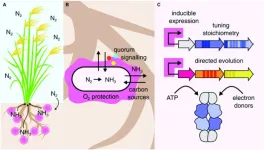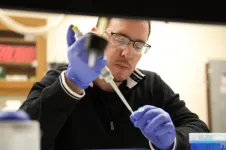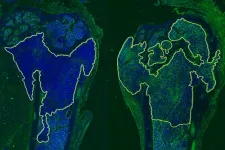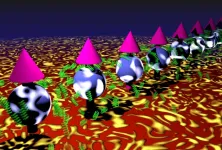(Press-News.org) Fertilizers are one of the main reasons that we are able to grow enough crops to feed the almost 8 billion humans living on Earth. Modern agriculture depends largely on nitrogen-based fertilizers, which significantly increase the yield of crops. Unfortunately, a great portion of these fertilizers are produced at an industrial level, consuming fossil fuel energy and causing nitrogen pollution.
One attractive way to minimize our use of industrially produced fertilizers is to harness the power of nitrogenases. These enzymes, found in various microorganisms, can carry out nitrogen fixation, i.e., the conversion of nitrogen gas (N2) to ammonia (NH3), which is a more biologically useful form for plants. Using bioengineering tools, we could introduce the genes that code for nitrogenases from one species of bacteria into another species (a ‘heterologous host’). The ultimate goal of this process would be to engineer a new type of bacteria that can survive in the field alongside crops and provide plants with NH3, thereby reducing the need for so much industrial fertilizer.
However, this strategy has proven to be difficult to pull off, and researchers are still trying to overcome many roadblocks. Motivated by this, a team of scientists including Professor Mark Isalan from Imperial College London, UK, recently published a review article online, on 7 February 2023 in Volume 5 of BioDesign Research. In it, they highlight recent progress towards understanding and surpassing the challenges found while engineering organisms to express and use nitrogenase.
Nitrogenase and its associated enzymes are coded by nif gene clusters, which are present across various species of bacteria with some variations. Though these gene clusters are complex, some researchers have managed to pinpoint a minimal set of genes that are essential for nitrogen fixation. This is essential knowledge for the logical next step: transferring custom nif genes to a heterologous host.
One of the main issues in engineering nitrogen-fixating bacteria is making sure the transferred nif clusters are compatible with the survival of the organism. As explained in the review, producing nitrogenases and using them is a resource- and energy-intensive endeavor for bacteria. If the engineered organisms derive no benefit from expressing the new genes, they are very likely to be outcompeted by other bacteria in the soil or escape the ‘useless’ genes by evolving against them. Moreover, the expression of nitrogenase is usually regulated by complex chemical pathways that, in turn, are regulated by environmental variables, including nitrogen concentration or chemical signaling from plants. Thus, many approaches for increasing NH3 production in heterologous hosts haven’t led to much success. Another thing to keep in mind is that nitrogenases are easily damaged by oxygen, and the heterologous host will need mechanisms to avoid this issue.
The review puts great emphasis on symbiosis, as the survival of engineered organisms out in the field will depend on their relationship with the target crop. For starters, the crop plant should ‘reward’ nearby nitrogen-fixating organisms by exchanging sugars with them, as well as provide appropriate chemical signals to guide nitrogenase expression. In turn, the bacteria should ideally kick off NH3 production only when near the plant’s roots. Hence, the overall goal of engineering organisms towards a symbiotic relationship is to give both species an edge in the fight for survival. However, as Isalan remarks, we are yet to achieve this target: “Survival of engineered bacteria in real-world environments has not yet been explored in detail, and much work needs to be done toward engineering synthetic symbioses that survive competition with other soil microorganisms.”
The article also introduces a promising approach called ‘directed evolution,’ which consists of controlled laboratory experiments where engineered bacteria are made to compete with one another. The experiments are set up so that the ‘winning’ genes are more suitable in a real environment or, alternatively, shed some light on specific molecular mechanisms of nitrogen fixation.
There are certainly many hurdles to overcome if we want engineered bacteria to help us fertilize the soil, and there are even more possible ways in which we may tackle these challenges. “Whichever approach is used, improving nitrogenase activity toward nitrogen-fixing plants is a complex and challenging engineering problem, which will require creative solutions as varied and dynamic as those we see in the natural world," concludes Isalan. Only time will tell what scientists can come up with in this field!
###
Reference
Authors
Emily M. Bennett1, James W. Murray1, and Mark Isalan1*
Corresponding author email ID: m.isalan@imperial.ac.uk
Affiliation
1Department of Life Sciences, Imperial College London
END
A better way to produce fertilizers
Engineering crops or symbiotic bacteria that can produce nitrogen fertilizer is challenging, but scientists have made substantial progress over the years
2023-03-08
ELSE PRESS RELEASES FROM THIS DATE:
University of Cincinnati study finds little federal funding for incarceration-related research
2023-03-08
Research from the University of Cincinnati finds a lack of federal funding for incarceration-related research. The study looked at data from the Department of Justice, National Institutes of Health (NIH) and National Science Foundation, some of which dated back to 1985.
The study was published recently in the journal JAMA Network Open.
“We have very little evidence-based research on how and when to intervene with children and families when someone is removed from the home due to incarceration, especially on how to ...
How nanoplastics can influence metabolism
2023-03-08
PET, the plastic used to make bottles, for example, is ubiquitous in our natural environment. In a joint study, scientists from Leipzig University and the Helmholtz Centre for Environmental Research (UFZ) investigated the negative effects that tiny plastic PET particles can have on the metabolism and development of an organism. Their findings have now been published in the journal Scientific Reports.
The increasing use of plastic is threatening ecosystems around the world. One of the big concerns is the presence of plastics in the form of small particles, also called microplastics and nanoplastics. ...
Virginia Tech researchers study PTSD effects on bystanders
2023-03-08
The traditional line of thought is that post-traumatic stress disorder (PTSD) is caused by directly experiencing the traumatic event. However, about 10 percent of diagnosed PTSD occurs when people witness these events versus experiencing it directly themselves.
Little is known about these cases of PTSD, but that’s something that Tim Jarome, an associate professor in the College of Agriculture and Life Sciences School of Animal Sciences, is aiming to change with a $430,000 grant from the National Institute ...
New pain medications are still widely inaccessible to individuals living with sickle cell disease
2023-03-08
(WASHINGTON, March 8, 2023) – Sickle cell disease (SCD), a rare chronic, progressive, life-threatening, inherited blood disorder, often affects individuals with chronic pain that can be debilitating to their quality of life. Yet less than 4% of people living with SCD who experience chronic pain episodes have prescriptions for newer FDA-approved pain-relieving drugs, including l-glutamine, voxelotor, and crizanlizumab, according to a new study published in Blood Advances. Further, researchers found that less than a third of patients with pain episodes have prescriptions for hydroxyurea, ...
Two-pronged immunotherapy eliminates metastatic breast cancer in mice
2023-03-08
Metastatic breast cancer has no cure and has proven stubbornly resistant to one of the most innovative and promising new cancer treatments: immunotherapy.
Now, researchers at Washington University School of Medicine in St. Louis have identified a way to treat the area surrounding breast tumors that have spread to bone so that such tumors become vulnerable to attack by the body’s immune system. When the researchers boosted the activity of certain immune cells, called T cells and macrophages, these immune cells worked together to clear metastatic breast tumors that had spread to the bones of mice, and continued to eliminate tumor cells ...
Researchers take a step towards turning interactions that normally ruin quantum information into a way of protecting it
2023-03-08
Researchers have found a way to predict the behavior of many-body quantum systems coupled to their environment. The work represents a way to protect quantum information in quantum devices, which is crucial for real-world applications of quantum technology.
In a study published in Physical Review Letters, researchers at Aalto University in Finland and IAS Tsinghua University in China report a new way to predict how quantum systems, such as groups of particles, behave when they are connected to the external environment. ...
Long-term exposure to nitrate in drinking water may be a risk factor for prostate cancer
2023-03-08
The nitrate ingested over the course of a person’s adult lifetime through the consumption of tap water and bottled water could be a risk factor for prostate cancer, particularly in the case of aggressive tumours and in younger men. This is the conclusion of a study conducted in Spain and led by the Barcelona Institute for Global Health (ISGlobal), a centre supported by the ”la Caixa” Foundation. The findings have been published in Environmental Health Perspectives.
The study also suggests that diet plays an important role. The researchers found that eating plenty of fibre, fruit/vegetables and vitamin C could reduce the negative effect ...
UNIST receives generous gift from BNK Kyongnam Bank
2023-03-08
UNIST and BNK Kyongnam Bank recently held a donation agreement ceremony in pursuit of creating a beautiful, biodiverse, and sustainable kitchen garden on UNIST campus.
A ceremony to commemorate and display gratitude for BNK Kyongnam Bank also took place on Friday, February 24, 2023. As part of its Carbon Neutral Campus Project, UNIST has been implementing a number of projects to improve sustainability on campus and in the surrounding community, including the creation of an ecological garden that ...
Seeking leukemia’s Achilles heel
2023-03-08
A team of researchers has discovered a potential therapeutic that can synergize with existing drugs to more effectively kill certain leukemia cells. The authors published their results on Jan. 19 in the journal Molecular & Cellular Proteomics.
Acute myeloid leukemia is a cancer of developing immune cells. It can manifest in all individuals, including the elderly and children. Only 30% of patients survive beyond five years of diagnosis
Unlike cancers of solid organs, AML is found in bodily fluids, such as blood. Like passengers ...
Men over 65 are at greater risk than women of skull fractures from falls
2023-03-08
Each year, more than 3 million people ages 65 and older are treated in emergency departments for fall injuries. Head trauma is the leading cause of serious injury with skull fractures being reported as a serious outcome. According to the 2016 National Trauma Database annual report, females account for 58 percent of these falls.
Because geriatric females have an increased rate of falls and facial fractures, determining if they also are at an increased risk of skull fractures is crucial. Currently, research ...
LAST 30 PRESS RELEASES:
Roadmap for Europe’s biodiversity monitoring system
Novel camel antimicrobial peptides show promise against drug-resistant bacteria
Scientists discover why we know when to stop scratching an itch
A hidden reason inner ear cells die – and what it means for preventing hearing loss
Researchers discover how tuberculosis bacteria use a “stealth” mechanism to evade the immune system
New microscopy technique lets scientists see cells in unprecedented detail and color
Sometimes less is more: Scientists rethink how to pack medicine into tiny delivery capsules
Scientists build low-cost microscope to study living cells in zero gravity
The Biophysical Journal names Denis V. Titov the 2025 Paper of the Year-Early Career Investigator awardee
Scientists show how your body senses cold—and why menthol feels cool
Scientists deliver new molecule for getting DNA into cells
Study reveals insights about brain regions linked to OCD, informing potential treatments
Does ocean saltiness influence El Niño?
2026 Young Investigators: ONR celebrates new talent tackling warfighter challenges
Genetics help explain who gets the ‘telltale tingle’ from music, art and literature
Many Americans misunderstand medical aid in dying laws
Researchers publish landmark infectious disease study in ‘Science’
New NSF award supports innovative role-playing game approach to strengthening research security in academia
Kumar named to ACMA Emerging Leaders Program for 2026
AI language models could transform aquatic environmental risk assessment
New isotope tools reveal hidden pathways reshaping the global nitrogen cycle
Study reveals how antibiotic structure controls removal from water using biochar
Why chronic pain lasts longer in women: Immune cells offer clues
Toxic exposure creates epigenetic disease risk over 20 generations
More time spent on social media linked to steroid use intentions among boys and men
New study suggests a “kick it while it’s down” approach to cancer treatment could improve cure rates
Milken Institute, Ann Theodore Foundation launch new grant to support clinical trial for potential sarcoidosis treatment
New strategies boost effectiveness of CAR-NK therapy against cancer
Study: Adolescent cannabis use linked to doubling risk of psychotic and bipolar disorders
Invisible harms: drug-related deaths spike after hurricanes and tropical storms
[Press-News.org] A better way to produce fertilizersEngineering crops or symbiotic bacteria that can produce nitrogen fertilizer is challenging, but scientists have made substantial progress over the years





